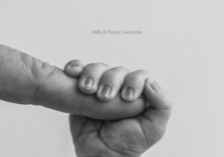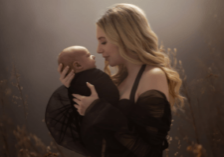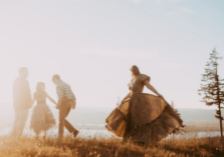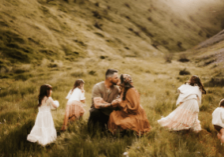Simplicity, Systems, and Sustainability: How To Keep Your Photography Brand Stable and Consistent with Ingvild Kolnes
When it comes to our photography careers, things can get complicated fast. Adding more sessions, more price tiers, more options and locations, etc. And while that can be good for building your business in the short term, it can also be a fast-track to burnout.

In this episode, I’m joined by Ingvild Kolnes who is sharing how she keeps her business simple and sustainable. She is offering some great advice on how she sets (and holds) boundaries in her photography business, how she stays connected to the parts of photography that she loves the most, and how all of that helps her to avoid burnout.
She’s also sharing a little about her mentorship program and how she teaches other photographers to build stable business too!
What’s in this episode:
- [02:03] How Ingvild found herself becoming a mentor to photographers
- [05:41] Ingvild’s advice on not overcomplicating your photography business
- [07:00] How to avoid burnout and find the joy in photography again
- [15:10] How photographers can set boundaries and avoiding the “yes” trap
- [19:04] Ingvild’s advice for building confidence in your photography work\
If you feel like you’ve been getting lost in your photography business, this episode is for you.
SUBSCRIBE: Apple Podcasts | Spotify
Meet Ingvild Kolnes
Ingvild Kolnes is an educator and mentor for photographers. She helps talented but overworked photographers get back in touch with the artist they want to be where they work with dream clients without having to work too much. She does this by helping them build their confidence and set boundaries, and teaching them to charge what their work is worth so that they can make a living from their creativity.
Connect with Ingvild
Visit Ingvild’s photography website
Did this episode with Ingvild Kolnes make you rethink what a sustainable photography business looks like? Check out this episode Branding & Business without Burnout : Growing a Sustainable Brand Photography Business with Meg McMillan which shares how another photographer started their career!
Transcript
[00:00:00] Ingvild: Am I really feeling inspired to do this? Do I want to spend my time doing this or that? Because if we want to do something, then we’re so likely to just keep saying yes and not even look to see what we’re sacrificing because none of us can do it all. If you say yes to one thing, you are in fact saying no to something else.
[00:00:22] So I would say just check in, make sure that you are living the life that you want to, that you are aware of what your values are, that you know your priorities and that you’re sticking to it. So for me, I would say planning is key so that I don’t to say yes to things that I actually don’t have time for and, and actually block time off just for myself and doing the things that I need to, that aren’t business related.
[00:00:53] Lisa: Hey friend, welcome to the Art and Soul Show. I’m your host Lisa DiGeso, a mom, a photographer and [00:01:00] entrepreneur. Tune in here for pep talks, conversations, and advice on photography, creativity, mindset, business, life, and that messy in between. This is the place where you can go when you need a boost of encouragement, a kick in the pants, and inspiration to pick up your camera.
[00:01:15] This is the Art and Soul Show. Hello, my beautiful friends. Welcome back to the show today. I’m super excited to dive into today’s conversation with Ingvild Kolnes. Ingvild is an educator and mentor for photographers based in Norway. She helps talented but overworked photographers get back in touch with the artist they want to be, where they work with their dream clients without having to work too much.
[00:01:39] She does this by helping them build their confidence and set boundaries and teaching them to charge what their work is worth. So they, they can make a living from their creativity. So welcome. Thank you. Wow. I’m so excited to be here. So can you share a little bit about your photography journey into photography education and really [00:02:00] what made you decide to become a mentor for photographers?
[00:02:03] Ingvild: Oh, yeah, absolutely. So I started my photography business in 2010, 2011, so quite, yeah, some time ago now. And I did it in the completely wrong way. My prices were too low. I didn’t have any, like, boundaries. I said yes to anything from newborns, I did a lot of model calls, I did a lot of, uh, weddings and families.
[00:02:30] I just did whatever I came across. Well, I didn’t know that that was wrong at the time, of course, cause I just did whatever I wanted to. And then after a while, I realized that this isn’t really working out. There’s a lot of missing pieces here. I need to actually be profitable. I need to figure this stuff out.
[00:02:52] And then I also realized that the business stuff is kind of fun. Like all the boring stuff that people are [00:03:00] complaining about. I like that. And I think it was when I had a conversation with a friend of mine, just like DMs on Instagram, while I had a wedding the next day. Okay. And I could really feel like I would much rather stay up talking with my friend about business stuff and helping her out rather than just being excited about the wedding the day after.
[00:03:25] And that was a new feeling for me. And that’s when something started to shift and I was like, okay, I think I want to do more with this. And then later on, when I. I just really started to notice how many photographers ended up getting burnt out and exhausted and giving up was when I was like, okay, I think I know how to help them.
[00:03:47] I really need to do something with this. That’s really how it
[00:03:51] Lisa: started. I love it. So are you still shooting photography at all or you’ve completely just kind of stepped back? I do it a little bit,
[00:03:57] Ingvild: not a lot. I just [00:04:00] did a family shoot for a previous client, a previous wedding client this weekend. I’m doing one next weekend and my brother just got married, so I photographed his wedding, but that’s almost it.
[00:04:10] I still do a couple of elopements a year, but that’s really it. Yeah.
[00:04:13] Lisa: Yeah. I love that. I’ve been on a similar journey myself where, you know, I was simultaneously running two companies. We’ve had Milky Way for 12 years and I’ve had my photography company for 14. So, It got to the point where I’m like, I just, I don’t have that same sparkle in my photography business right now that I do have for Milky Way and having conversations in the podcast and creating amazing events for our students that I kind of had to like get honest with myself.
[00:04:39] And I think that’s one thing that we really struggle with is actually when things change, being honest with ourselves that we need to do something about it once we notice it.
[00:04:50] Ingvild: Absolutely. That is really so important. And I think it’s when you think you just have to do what you’ve always done.
[00:04:57] Lisa: That’s when it becomes a problem.[00:05:00]
[00:05:00] And I think that especially with working with the photographers that you’re working, I mean, I, that was my story too, over, overworking, undercharging, over delivering, giving everything, saying yes to everything at the sacrifice of my own mental health, physical health, my family life. It’s just, you just run yourself into the ground.
[00:05:17] So I love that you’re specifically trying to help photographers. Avoid that, or even You know, get out of that. So as photographers, we can really overcomplicate our businesses and our systems. So do you have any advice, especially because a business is a love of yours to keep it sustainable and simple?
[00:05:38] Because I think we get really hung up.
[00:05:41] Ingvild: I think you’re right. Um, I think especially for photographers, it’s like, it’s so fun driven, like, Oh, I like this cause it’s fun. I want to buy this cause it’s fun. I would just urge people to just take a little step back and just see what do I actually need to make sure that my business is [00:06:00] profitable.
[00:06:00] I really want you to start there, making sure that your prices are clear, that you’re not over complicating it, trying to add in every possible thing. Just keep it really simple and make sure overcomplicating it. Um, when you are at full capacity, that you can pay yourself whatever it is that you are needing and wanting to, um, and then making sure that your booking process is just streamlined and simple, that you’re not doing too much work.
[00:06:28] And I would also say, keep track of what is working and what is not working. We so often just get caught up doing whatever we’ve always done without checking in. And like, it’s They’re actually a purpose and a reason behind me being on Instagram three hours every day, or am I just doing it because I’m so used to doing it?
[00:06:51] Yeah. So if you’re seeing that, actually, that doesn’t lead to anything, my clients aren’t on there. Just stop using it. Just do something else with that time. [00:07:00] So yeah, I
[00:07:00] Lisa: would say that. I love that. So burnout is something that insidiously happens and it creeps up on us. So what proactive steps can photographers take to prevent burnout in their careers in the first place?
[00:07:13] Ingvild: That is a great question. And actually, I released an episode on my own podcast yesterday about this with a fellow photographer who actually quit because she reached burnout. Yeah. Um, it’s just. really, really important to set boundaries. And not just like, this is what I charge. I don’t want to do that.
[00:07:33] That’s all I kind of a given. If you start to think about it, like say no to the work you don’t want to do, make sure that you charge, don’t work all hours of every day. But also to check in, like, am I really feeling inspired to do this? Do I want to spend my time doing this? Or that because If we want to do something, then we’re so likely to just keep saying yes, [00:08:00] and not even look to see what we’re sacrificing, because none of us can do it all.
[00:08:04] If you say yes to one thing, you are in fact saying no to something else. So I would say just check in, make sure that you are living the life that you want to, that you are, Aware of what your values are, that you know your priorities and that you’re sticking to it. So for me, I would say planning is key so that I don’t just say yes to things that I actually don’t have time for and, and actually block time off just for myself and doing the things that I need to that aren’t business
[00:08:33] Lisa: related.
[00:08:35] I think that’s one thing that we often forget, especially when we are. Entrepreneurs and photographers, and we are yes people. We forget to take that time just to say, okay, what brings me joy? What do I want to do? And we kind of let that be the first thing that slips away.
[00:08:51] Ingvild: Mm-Hmm, . And so
[00:08:52] Lisa: of course we get burnt out and frustrated because we’re not doing the things that bring us joy.
[00:08:56] Of course, photography probably did in the beginning. [00:09:00] But when it’s become monetized and something that you have to repeatedly show up, it creates more anxiety. And the mental load of that, that was one thing that I really underestimated was the mental load and like the way I would feel before a session and the anxiety that would come out in me.
[00:09:16] And my husband was the one that said, you know, like, I don’t know if photography is actually good for you. I was like, what do you mean? I love it. It’s like my passion. I love it. He’s like, I, he’s like, you should see how you are before a session. He’s like, you’re so stressed out. And I got really curious about that and I’m like, okay, well, what’s causing me to stress out?
[00:09:34] I’m like, I’m afraid it’s going to fail. I’m afraid I’m going to disappoint people. Yeah. I think that’s very relatable. Right? We often just get in this like hamster wheel of just doing what we’re doing and not questioning how we feel. Is this working? Is this the quality of life I want to be living? Right?
[00:09:52] Is this the business I want to have? Yeah. So I think like, I love that you’re working with clients to help unpack that because I think that that’s something [00:10:00] that really is ignored a lot.
[00:10:02] Ingvild: Yeah. And I also think that most photographers I know of. They started photography because it was a passion. It was something that they enjoyed doing for fun.
[00:10:12] And as a photographer with a business, the time you spend photographing is actually so tiny. There’s so many other things that you probably didn’t, maybe you didn’t even know about it going into it. Editing is one part of it, but what about all the marketing and all the emails and all the legal stuff you have to deal with, accounting, and there’s so many things.
[00:10:34] So many things. Yeah. I think if you just kind of. take care of that, make sure that you’ve got it covered, then it just really frees up so much time and creativity instead of, like, dragging your feet and just avoiding it, because it’s not, it’s not going to help. It’s not going to go away. Nope. Like and it just gets, the
[00:10:51] Lisa: pile gets bigger.
[00:10:52] You put a pile under there, it just gets bigger. So how do you help photographers establish a [00:11:00] healthy work life balance so they mitigate those feelings of overwhelm? Well, there’s,
[00:11:05] Ingvild: there’s different things that you can and should do, but I would say systems. Systems go a long ways. Having systems around while you’re working.
[00:11:14] Planning and scheduling and maybe batch working for some people helps a lot and also systems around paying yourself, making sure that you. Pay yourself first, not like buy all the fun stuff for your studio first, but pay yourself first and then, you know, make sure that your expenses are covered and all that.
[00:11:35] Um, that helps a lot because as soon as we are stressed with our finances, that just kind of takes over everything. So that is really important. And. I would also say to be intentional about your schedule to make sure that you’re not adding on too many clients in your week. Because you have to have time for all the other stuff, because remember, photography is only a small fraction of the time that you [00:12:00] need.
[00:12:00] So having long deadlines for delivery, that’s always a good thing. And I would also say, like, not let your client work come first to do the other stuff and maybe have a set day a week where you work on that. That can be really helpful because we have to remember that when you’re a photographer with a business, the business is important.
[00:12:24] You can’t just focus on the client stuff because then you’ll never have any time to build your business. You’ll never have any time to improve it. So, that’s definitely important, but I would also say in terms of marketing, having an on brand website that can do a lot of the work for you, because social media, that’s like, you can so easily just get caught up in it and spend hours on there, and it’s not necessarily going to lead to anything.
[00:12:53] Finally, I would. say, learn to say no, say no to things that isn’t aligned with your goals, [00:13:00] anything that doesn’t excite you. And if you do have to say yes to it for like, financial reasons, you don’t have to share about it. Just do it and then just keep it to yourself so that you don’t attract more of it.
[00:13:13] Lisa: What was interesting to me is I realized in my business resentment was really starting to creep in and it was a good indicator that I’m not charging enough because my, you know, my intuition was telling me that this isn’t worth my time. I’m worth so much more than this. Um, and that resentment was that I was saying yes to it and I was mad at my clients, but I should have been mad at myself.
[00:13:37] Ingvild: Exactly. And that’s, that’s so relatable. And actually for one of my last weddings, like I was, I was very done, like after the pandemic and everything, I was so done. Um, I was told that during the wedding, like, Oh, this is so expensive. It’s so expensive. And it just got me so stressed. And then I knew that it wasn’t that expensive.
[00:13:58] And yeah, so you’re [00:14:00] right, that resentment, we have to be really careful. And that’s also why I always recommend, especially for wedding photographers, because we tend to get booked out so far in advance, like, yes, don’t do it. But just say no until, like, closer to the date. Because if you charge the prices If you have a wedding in two years and you charge the prices you have now, you’re going to resent yourself for saying yes to that.
[00:14:28] That’s going to lead to you giving your client a bad experience. And I’m sure it’s the same if you’re a newborn photographer and you are married. Maybe like, ah, I think that my prices are okay. And then six months down the line, you’re like, actually, I should have doubled them and then you’re stuck working with clients at that rate.
[00:14:49] So just be really careful, know your prices, be sure that you’re not only profitable, but that you’re charging what you want to charge so that you don’t have to [00:15:00] increase your prices. Cause often means you have to just start all over again. And
[00:15:05] Lisa: it’s so sad. We built a brand new clientele and yeah, a hundred percent.
[00:15:10] Right. So as a former yes girl who said yes to everything, I would like to know your thoughts on how photographers can practice saying no to projects or requests that don’t align with their boundaries or their values, especially when you’re having some lean months or not a lot of client inquiries. Oh yeah.
[00:15:30] That I can
[00:15:31] Ingvild: just feel that I feel the feeling of like, Oh, I feel like I have to say yes. Cause yeah, I’ve so been there. I’ve been there when I’ve had to like, I know this is a bad idea to say yes to, but I’m gonna say yes anyway. And I don’t think there’s necessarily a right or wrong way to deal with that kind of a situation, but I would say to really just take a step back, just stop for a moment, and take a look at your goals, take a look at, like, the long term [00:16:00] plan, the long term thing that you want to accomplish, and Um, try to put yourself in the situation where you’ve reached the place where you want to be and see what would that person say?
[00:16:11] Would that person say yes to this assignment or not? And that would tell you a lot because sometimes it’s okay to say yes to something and just like, okay, it’s for the money and just be aware that that’s what you’re doing. And other times it’s really not because whenever, like we talked about before, whenever you say yes to something.
[00:16:31] You are saying no to something else and once that date is booked or once your energy is spent, you’re not going to get that back.
[00:16:40] Lisa: And even the mental energy around like anticipating it and like you already are doing it and planning it far before you’re actually there. So it’s like double the time, right?
[00:16:50] It
[00:16:50] Ingvild: is. It is. I think it’s just really important to just take a step back and, and see if, if there’s something else that you could be doing instead. [00:17:00] Maybe you need to do Like a bigger transformation in your business to make sure that you can sustain yourself, that your business will be okay. And maybe you need to take a, I would actually say that if you’re really struggling, having a part time job next to your business is better than just forcing yourself to do work that you don’t want to do, because that can easily ruin your whole business, your brand, and your like outlook and energy for photography.
[00:17:30] Lisa: A hundred percent. That’s an excellent point. There’s, there’s no shame in that, right? Absolutely not. Yeah, just, and it’s like even looking at what goals do you have? Like, what does success actually look like to you? Is it four sessions a month? Is it 40 sessions a month? Because there’s going to be different advice and different methods and systems and things that you’re going to do based on whatever goals you have, right?
[00:17:52] Ingvild: Absolutely. Yeah. And we’re so different. And. I would also say like, stop looking at the photographers around you because they don’t know [00:18:00] anything about your business. Like you said, maybe they just want to have four sessions. Maybe they have another job that really supports them. Maybe they have something else and this is just like a fun thing for them.
[00:18:11] So look at yourself and what you are doing. And I would also say like, it’s good to have a network of like minded people around you. But even then, you can’t use their business as your business. Whatever is right or wrong for you, but it, it can be really nice to have someone supportive around you.
[00:18:31] Lisa: And a lot of times we try to make that person our spouse, and they don’t always Yeah.
[00:18:36] That’s not necessarily a very good idea. No. It’s good to have a photographer network, my friends.
[00:18:43] Ingvild: Uh, yeah, I would say so. I don’t know. That there are that many photographers who get the best business advice from their spouse. It’s often things like, Oh, you should offer more different things and you should lower your prices and have more clients.
[00:18:56] And what do you mean you’re going to spend that much money on a course? It’s [00:19:00] like, yeah, you don’t get it because you don’t have a business. So it’s not
[00:19:04] Lisa: a good idea. Yep. A hundred percent. I love it. So you mentioned helping photographers build their confidence. So what are some practical exercises or techniques you recommend?
[00:19:12] It’s,
[00:19:14] Ingvild: I would say maybe one of the most important things is to make sure you take note of whenever things go well, write down all your or save all your testimonials, every review you get, all the Nice things people say in emails when they receive their photos, take screenshots of that and just put it in a folder.
[00:19:32] And of course use it, like, put it on social media, on your website. But for you, just like, take a note of it, make sure that you know that, yeah, this went well. And you can also do like, a diary of shoots, either in writing or maybe when you’re Leaving a session, you could do a voice note, uh, telling yourself how you did, like, you did a really good job.
[00:19:53] And the client was really happy with just like the positive, good things, because there’s going [00:20:00] to come a time when you’re going to need that. And there’s no stronger, or there’s no more powerful way to receive that encouragement than from yourself, because we’re always our biggest critic. So I think that is really, really, really powerful.
[00:20:17] Um, I’ve been talking a little bit about goals, but I think goal setting can be really important as well, but you just have to keep in mind that the goal of a goal isn’t to reach it, it’s just to get yourself in the right direction. And along the way to make sure that you celebrate the milestones, like the things that you accomplish, because that’s going to be like proof to yourself that I could do this.
[00:20:42] I did it. I sold my top package last week. I can do it again. I had that great month that three months ago. I can have another one of those because if not, We can so easily get discouraged. Like there’s no way I can reach last year’s revenue, like I’ll never have a client [00:21:00] like that again. But if you can just turn it around and show yourself what’s possible, I think
[00:21:04] Lisa: that is so powerful.
[00:21:06] I love it. I think definitely switching the mindset is like, it’s a huge thing. And even looking at like different blocks we have, whether it’s like clients won’t pay a certain amount or my clients are never going to want to. Do albums. Yeah. If I’ve always done all digital. Right. And it’s just, we have to get over these stories that we tell ourselves that aren’t necessarily true.
[00:21:27] And they’re really based on our own fears and not on fact.
[00:21:30] Ingvild: Yeah. And when we get like inquiries that we feel so aligned with and they end up not booking, that happens to all of us. Yeah. But instead of feeling that that is a defeat, like I can’t believe they didn’t book me. My business is going down. Think about it at the right people found me, they wanted to work with me.
[00:21:52] That’s proof that there are more people out there like that. And I would say that most situations you can turn [00:22:00] around and make a positive thing, but you don’t necessarily have to do it alone. I always have a coach that I can go to when something happens. And I’m like, this thing happened. I don’t know what to do.
[00:22:11] And then you can get those little nudges to shift the way you think and that is so powerful.
[00:22:19] Lisa: I love that. So what has been the best piece of business advice you’ve ever been given?
[00:22:25] Ingvild: I would say to keep going. As soon as you give up, then you’re done. And there’s always going to be low months, bad clients, bad reviews, like something bad is bound to happen, but you just shouldn’t let it stop you.
[00:22:42] So just keep going. I love that.
[00:22:45] Lisa: So, are you ready for our lightning round?
[00:22:47] Ingvild: Okay.
[00:22:48] Lisa: Okay. If you have a hidden talent, what is it?
[00:22:52] Ingvild: I can play the piano. Not a lot of people know that. Is that, that’s not, is that, it’s a little bit of a hidden talent, yeah.
[00:22:56] Lisa: Yeah. I like that. That’s great. Last [00:23:00] book you read? It was Building a Story Brand by Donald Miller.
[00:23:03] Oh, that’s a good one. It is a good one. That’s a good one. Do you like to buy business books? Uh, yeah. I have two hobbies. One is buying them and one is reading them and sometimes I just buy them. And I feel like I wish that was all
[00:23:18] Ingvild: it took, just buying them. And then, yeah. But yeah, you should read this idea.
[00:23:23] I should read this as
[00:23:24] Lisa: well. However. Yep, I have the same one. I have, I have an entire shelf at my home office and I’ve color coordinated all of them.
[00:23:33] Ingvild: Wow. Just for fun. Right. That’s
[00:23:36] Lisa: amazing. I love that. City or countryside? Which do you prefer? Countryside. Last show you binge watched? Friends. Actually, you know what’s so funny?
[00:23:49] So did I. Like, just recently. Really? Yeah, just went back and watched it. If you had to eat one meal for the rest of your life, what would it be? Probably [00:24:00] lasagna. Mmm. It’s a good one. Best concert you’ve ever been to?
[00:24:06] Ingvild: That must have been Muse, way back in the day. Describe yourself in three words. Stubborn, kind, and smart.
[00:24:22] Lisa: I like it. Are you a Scorpio?
[00:24:24] Ingvild: No, Capricorn.
[00:24:28] Lisa: I’m a Scorpio and I am stubborn. Let’s see, what makes your soul
[00:24:34] Ingvild: light up? Seeing other people succeed and achieving things that they didn’t think they had in them. Love that.
[00:24:44] Lisa: What advice do you have for someone just starting out in photography? I would say,
[00:24:50] Ingvild: don’t try to do it alone.
[00:24:52] Have someone there by your side. Make sure that you have some photography friends. Make sure that your prices, that you actually work out your [00:25:00] prices. Don’t guess them. Don’t look at other photographers. Figure them out based on how much you want to work and how much you need to pay yourself. Don’t look at anyone else and yeah, have someone by your side.
[00:25:12] I like
[00:25:13] Lisa: that. So you mentioned you have a podcast. So where can our listeners learn more from you? Yeah.
[00:25:20] Ingvild: So I have a podcast, it’s called Sustainable Photography. It’s pretty much anywhere you can listen to podcasts. And other than that, you can find me on Instagram under Ingvild
[00:25:31] Lisa: Kålnäs. Love that. So I love to end my interviews just with this last question, and it is, what are you currently curious about or artistically curious about?
[00:25:41] Ingvild: Ooh, that is a good question. I would say. I’m curious as to how I can kind of create more, how I can create more education, how I can create more lessons and lectures, but also [00:26:00] make it fun so that it’s not like, Oh, I have to do this thing, but like, Ooh, I want to, I want to do
[00:26:05] Lisa: this thing cause it’s fun. I love it.
[00:26:08] Well, thank you so much for joining me today. It’s been such a treat getting to know you. Thank you so much. It’s, it was, I think the time just flew by. This has been great. I know. It, like, it was like that. Yeah, it was. Oh, my beautiful friends, I hope you have loved this conversation just as much as I have.[00:26:27] Thank you so much for tuning in. I’m sending you so much of my light and my love today and every single day. We will see you next time.
share the love
[Sassy_Social_Share]
recent
Podcasts
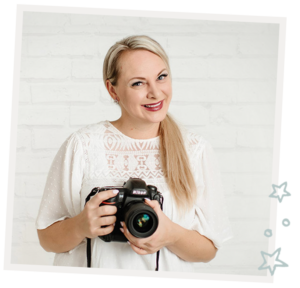
I'm
Lisa DiGeso
I’m on a mission to create uplifting online experiences for photographers ready to elevate their art, their business and their mindset.(...and have fun along the way!)















